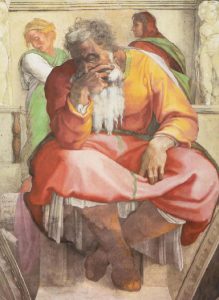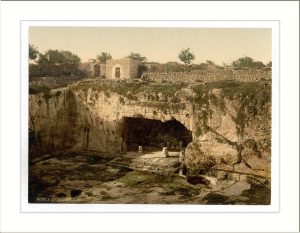The prophet Jeremiah was born in Anathoth, a small village in the kingdom of Judah, north of Jerusalem, within the territory populated by the tribe of Benjamin. He came from a priestly lineage, and his prophetic activity lasted more than forty years. He carried out his mission in Judah during the time when the new Babylonian Empire began to pose a threat to the Israelites (beginning in 605 B.C.), a threat that culminated in the ultimate fall of Jerusalem to the troops of Nebuchadnezzar in 587 B.C. and the deportations to Babylon. The prophet was a direct witness to these events and to the experiences of the population that remained in the territory of Judah.

The Prophet Jeremiah (1511) from the ceiling of the Sistine Chapel
The beginning of his ministry can be traced to the thirteenth year of the reign of King Josiah, in 627 B.C. During this initial phase, under the reign of Josiah, Jeremiah addressed the house of Israel, which, despite no longer possessing its actual kingdom (the northern one), remained alive in longing and memory. The oracles belonging to this period include denunciation of the apostasy and moral corruption of his fellow citizens, a call for conversion, and prediction of a severe chastisement due to the people’s abandonment of God.
Five years after his calling, in 622 B.C., King Josiah initiated an important religious reform which aimed to have the life of the kingdom governed according to the Law of God. Emphasis was placed on the truth that only the Lord is God, and on the need to centralize worship at the Temple of Jerusalem. Although Jeremiah must have been aware of this reform, there is no explicit reference to it anywhere in his book.

Jeremiahs Grotto Jerusalem, Holy Land
When Josiah died, and after the brief reign of Jehoahaz, King Jehoiakim ascended the throne in 609 B.C. Under him, there was a shift in the religious policies of the kingdom, as the new monarch did not follow the reformist measures implemented by Josiah. Within this context, while the violations of God’s Law and the Covenant multiplied, Jeremiah preached in Jerusalem. The most notable event of these years was his Temple sermon against corrupt worship and the imprisonment he endured because of it. Nevertheless, he continued his activity through his secretary, Baruch. During this time, he denounced the people’s major sins: external and false worship, misplaced religious security, idolatry, and social injustices.
Shortly after Jehoiakim died, Nebuchadnezzar conquered Jerusalem in 597 B.C., subjugated it, took the young monarch Jehoiachin—who had reigned for only a few months—and other prominent citizens captive, and left Zedekiah as king in the holy city. This marked a new chapter in Jeremiah’s life. At that time, he strongly rejected the position of those who remained in Judah, who regarded those deported as impious while claiming to be a faithful remnant. Meanwhile, most of Jerusalem’s inhabitants refused to acknowledge that what was happening was the deserved punishment for their repeated infidelities to the Covenant; and continued fighting to get rid of Babylonian rule, relying on their own strength or the help of foreign allies. Jeremiah, meanwhile, persistently exhorted them to accept the situation and submit while urging a profound interior conversion. His preaching engendered hostility in everyone—people, priests, prophets, and kings—and resulted in his imprisonment until the city fell to the Babylonians for the second time in 587 B.C.

Jeremiah the prophet prophesies the fall of Jerusalem to King Zedekiah by Joseph Stallaert
After the final defeat, the capture of Zedekiah, and a new deportation, Jeremiah remained in Judah, where Nebuchadnezzar had appointed Gedaliah as governor. However, Gedaliah was soon assassinated, and in the unstable situation that followed his death, many of those who remained in Judah fled to Egypt, forcing Jeremiah to accompany them. This concludes the accounts of his prophetic activity, which had spanned more than forty years.
Jeremiah loved the tranquility of a simple, ordinary life, but he was confronted with the strong demands of the Lord’s call and the mission entrusted to him. From the very beginning, he realized that his task would not be easy and would not be well received by the people. He experienced the way in which his activity became a source of mockery and provoked hostility, leading to painful and challenging situations. Yet, he remained faithful. In some ways, the so-called “confessions” summarize the prophet’s personality (Jer 11:18—12:6; 15:10-21; 17:14-18; 18:18-23; and 20:7-18). In these passages, he opens his heart to the Lord with sincerity and trust, expressing his struggles and sufferings with great intensity. He lays bare his inner turmoil, difficulties, and, at times, his discouragement, in raw terms; and yet he always demonstrates unwavering faithfulness. At all times, despite the difficult circumstances in which he had to live and work, he remained steadfast in the mission entrusted to him by the Lord.
By Francisco Varo Pineda, priest
